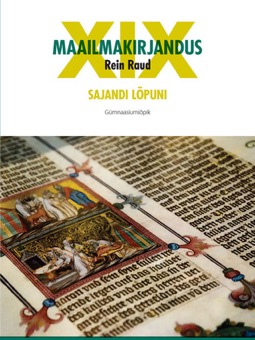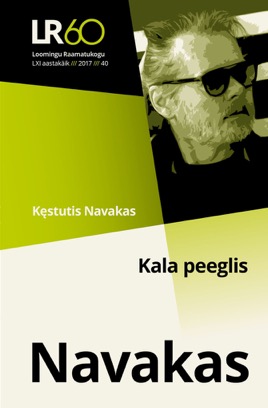2017
2017: Summary
31/12/17 07:41
In addition to The Bell and The Hammer, this year saw the publication of two further books by me. The first of these is a textbook on world literature for Estonian high schools, and by "world" I mean world. It was my condition when I undertook this work that I will not have to restrict myself to the official school programme, which contained the names of 40 authors, all male, all but one white. The book is thus quite different than what is normally published under such a title: it obviously covers the development of Western literatures, but also the Islamic world, the Indian subcontinent, China and Japan. I have also tried to show how the different parts of the world have influenced each other throughout ages - how, for example, Indian narratives have appeared in Western lore (mediated through Iran), or how Western love poetry owes much of its spirit to Arabic models. And, of course, there are chapters documenting the role of women authors around the world as well. The early phases of Estonian literature are also a part of this book, and these, too, I have tried to put into a broader context, for example, by letting the students know that the Young Estonia literary group established in the early years of the 20th century was not a local phenomenon, but very much a part of a broader trend originating in Young Italy, Young Germany and many others. I hope that the schools using this book will actually discuss all the chapters and not only those that are more pertinent to the official programme.
such a title: it obviously covers the development of Western literatures, but also the Islamic world, the Indian subcontinent, China and Japan. I have also tried to show how the different parts of the world have influenced each other throughout ages - how, for example, Indian narratives have appeared in Western lore (mediated through Iran), or how Western love poetry owes much of its spirit to Arabic models. And, of course, there are chapters documenting the role of women authors around the world as well. The early phases of Estonian literature are also a part of this book, and these, too, I have tried to put into a broader context, for example, by letting the students know that the Young Estonia literary group established in the early years of the 20th century was not a local phenomenon, but very much a part of a broader trend originating in Young Italy, Young Germany and many others. I hope that the schools using this book will actually discuss all the chapters and not only those that are more pertinent to the official programme.
The other book published this year is a translation of poems by Kestutis Navakas, a very interesting Lithuanian author. I've had the collection entitled 100two (with 102 poems in it) on my shelf since it appeared in 2013, but never got around to read it until this year. Eerily beautiful, rhythmically challenging, with images mingling throughout the book, it is one of the best poetic contemporary books of poetry that I have read over the recent years. A few translations soon grew into a volume, which contains about half of the collection and a talk we had. It is entitled A Fish in the Mirror, after a few lines from the first poem.
I've had the collection entitled 100two (with 102 poems in it) on my shelf since it appeared in 2013, but never got around to read it until this year. Eerily beautiful, rhythmically challenging, with images mingling throughout the book, it is one of the best poetic contemporary books of poetry that I have read over the recent years. A few translations soon grew into a volume, which contains about half of the collection and a talk we had. It is entitled A Fish in the Mirror, after a few lines from the first poem.
Several new translations of my own work appeared as well: The Reconstruction in English and Lithuanian, The Death of the Perfect Sentence in English and Latvian. I also appeared at the Vilnius Book Fair and the first European Literature Festival in Tokyo. There I had the opportunity to discuss my work with Prof.Mitsuyoshi Numano from the University of Tokyo as well as the honour of doing the European keynote speech, followed by the Japanese keynote speech by the poet, world-traveller and anthologist Natsuki Ikezawa.
Academically, most of this year was spent in the Free University of Berlin as a guest professor. In Berlin I also organised a philosophy workshop under the title of "Old solutions, new problems", where we discussed the ways how the challenges of the present - from climate change and the emergence of artificial intelligence to post-truth - can be analysed in the context of well-forgotten old philosophical arguments and debates. The "meeting of philosophies" of last year also turned out to be a first in a (hopefully longer) series: a second event of the same kind was organised by Dr.Chiara Robbiano in Utrecht to a great success. And - last but not least - this was also the year of the European Association of Japanese Studies triennial conference, this time in Lisbon, and with more than a thousand participants. For me, it was the last one where I was a part of the organising committee as the Immediate Past President of the organisation.

The other book published this year is a translation of poems by Kestutis Navakas, a very interesting Lithuanian author.

Several new translations of my own work appeared as well: The Reconstruction in English and Lithuanian, The Death of the Perfect Sentence in English and Latvian. I also appeared at the Vilnius Book Fair and the first European Literature Festival in Tokyo. There I had the opportunity to discuss my work with Prof.Mitsuyoshi Numano from the University of Tokyo as well as the honour of doing the European keynote speech, followed by the Japanese keynote speech by the poet, world-traveller and anthologist Natsuki Ikezawa.
Academically, most of this year was spent in the Free University of Berlin as a guest professor. In Berlin I also organised a philosophy workshop under the title of "Old solutions, new problems", where we discussed the ways how the challenges of the present - from climate change and the emergence of artificial intelligence to post-truth - can be analysed in the context of well-forgotten old philosophical arguments and debates. The "meeting of philosophies" of last year also turned out to be a first in a (hopefully longer) series: a second event of the same kind was organised by Dr.Chiara Robbiano in Utrecht to a great success. And - last but not least - this was also the year of the European Association of Japanese Studies triennial conference, this time in Lisbon, and with more than a thousand participants. For me, it was the last one where I was a part of the organising committee as the Immediate Past President of the organisation.